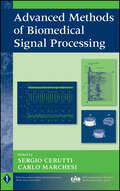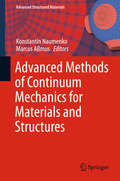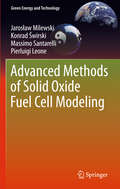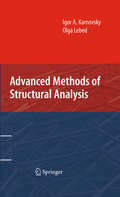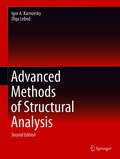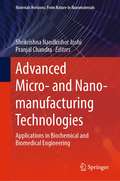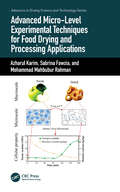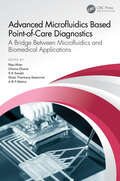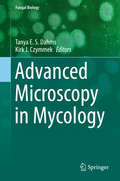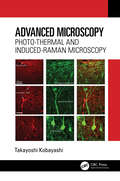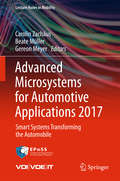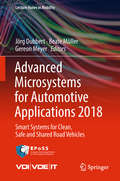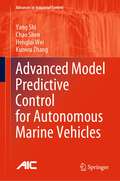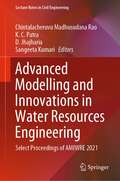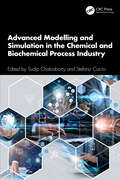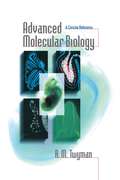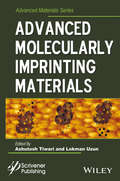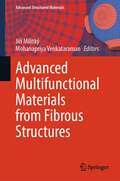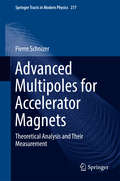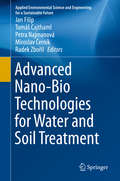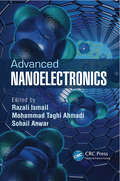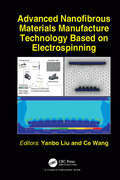- Table View
- List View
Advanced Methods of Biomedical Signal Processing (IEEE Press Series on Biomedical Engineering #27)
by Carlo Marchesi Sergio CeruttiThis book grew out of the IEEE-EMBS Summer Schools on Biomedical Signal Processing, which have been held annually since 2002 to provide the participants state-of-the-art knowledge on emerging areas in biomedical engineering. Prominent experts in the areas of biomedical signal processing, biomedical data treatment, medicine, signal processing, system biology, and applied physiology introduce novel techniques and algorithms as well as their clinical or physiological applications. The book provides an overview of a compelling group of advanced biomedical signal processing techniques, such as multisource and multiscale integration of information for physiology and clinical decision; the impact of advanced methods of signal processing in cardiology and neurology; the integration of signal processing methods with a modelling approach; complexity measurement from biomedical signals; higher order analysis in biomedical signals; advanced methods of signal and data processing in genomics and proteomics; and classification and parameter enhancement.
Advanced Methods of Continuum Mechanics for Materials and Structures (Advanced Structured Materials #60)
by Konstantin Naumenko Marcus AßmusThis volume presents a collection of contributions on advanced approaches of continuum mechanics, which were written to celebrate the 60th birthday of Prof. Holm Altenbach. The contributions are on topics related to the theoretical foundations for the analysis of rods, shells and three-dimensional solids, formulation of constitutive models for advanced materials, as well as development of new approaches to the modeling of damage and fractures.
Advanced Methods of Solid Oxide Fuel Cell Modeling (Green Energy and Technology)
by Jarosław Milewski Pierluigi Leone Massimo Santarelli Konrad ŚwirskiFuel cells are widely regarded as the future of the power and transportation industries. Intensive research in this area now requires new methods of fuel cell operation modeling and cell design. Typical mathematical models are based on the physical process description of fuel cells and require a detailed knowledge of the microscopic properties that govern both chemical and electrochemical reactions. Advanced Methods of Solid Oxide Fuel Cell Modeling proposes the alternative methodology of generalized artificial neural networks (ANN) solid oxide fuel cell (SOFC) modeling. Advanced Methods of Solid Oxide Fuel Cell Modeling provides a comprehensive description of modern fuel cell theory and a guide to the mathematical modeling of SOFCs, with particular emphasis on the use of ANNs. Up to now, most of the equations involved in SOFC models have required the addition of numerous factors that are difficult to determine. The artificial neural network (ANN) can be applied to simulate an object's behavior without an algorithmic solution, merely by utilizing available experimental data. The ANN methodology discussed in Advanced Methods of Solid Oxide Fuel Cell Modeling can be used by both researchers and professionals to optimize SOFC design. Readers will have access to detailed material on universal fuel cell modeling and design process optimization, and will also be able to discover comprehensive information on fuel cells and artificial intelligence theory.
Advanced Methods of Structural Analysis
by Olga Lebed Igor A. KarnovskyAdvanced Methods of Structural Analysis aims to help its readers navigate through the vast field of structural analysis. The book aims to help its readers master the numerous methods used in structural analysis by focusing on the principal concepts, as well as the advantages and disadvantages of each method. The end result is a guide to mastering the many intricacies of the plethora of methods of structural analysis. The book differentiates itself from other volumes in the field by focusing on the following: * Extended analysis of beams, trusses, frames, arches and cables * Extensive application of influence lines for analysis of structures * Simple and effective procedures for computation of deflections * Introduction to plastic analysis, stability, and free vibration analysis Authors Igor A. Karnovsky and Olga Lebed have crafted a must-read book for civil and structural engineers, as well as researches and students with an interest in perfecting structural analysis. Advanced Methods of Structural Analysis also offers numerous example problems, accompanied by detailed solutions and discussion of the results.
Advanced Methods of Structural Analysis
by Olga Lebed Igor A. KarnovskyThis revised and significantly expanded edition contains a rigorous examination of key concepts, new chapters and discussions within existing chapters, and added reference materials in the appendix, while retaining its classroom-tested approach to helping readers navigate through the deep ideas, vast collection of the fundamental methods of structural analysis. The authors show how to undertake the numerous analytical methods used in structural analysis by focusing on the principal concepts, detailed procedures and results, as well as taking into account the advantages and disadvantages of each method and sphere of their effective application. The end result is a guide to mastering the many intricacies of the range of methods of structural analysis. The book differentiates itself by focusing on extended analysis of beams, plane and spatial trusses, frames, arches, cables and combined structures; extensive application of influence lines for analysis of structures; simple and effective procedures for computation of deflections; introduction to plastic analysis, stability, and free and forced vibration analysis, as well as some special topics. Ten years ago, Professor Igor A. Karnovsky and Olga Lebed crafted a must-read book. Now fully updated, expanded, and titled Advanced Methods of Structural Analysis (Strength, Stability, Vibration), the book is ideal for instructors, civil and structural engineers, as well as researches and graduate and post graduate students with an interest in perfecting structural analysis.
Advanced Micro- and Nano-manufacturing Technologies: Applications in Biochemical and Biomedical Engineering (Materials Horizons: From Nature to Nanomaterials)
by Pranjal Chandra Shrikrishna Nandkishor JoshiThis volume focuses on the fundamentals and advancements in micro and nanomanufacturing technologies applied in the biomedical and biochemical domain. The contents of this volume provide comprehensive coverage of the physical principles of advanced manufacturing technologies and the know-how of their applications in the fabrication of biomedical devices and systems. The book begins by documenting the journey of miniaturization and micro-and nano-fabrication. It then delves into the fundamentals of various advanced technologies such as micro-wire moulding, 3D printing, lithography, imprinting, direct laser machining, and laser-induced plasma-assisted machining. It also covers laser-based technologies which are a promising option due to their flexibility, ease in control and application, high precision, and availability. These technologies can be employed to process several materials such as glass, polymers: polycarbonate, polydimethylsiloxane, polymethylmethacrylate, and metals such as stainless steel, which are commonly used in the fabrication of biomedical devices, such as microfluidic technology, optical and fiber-optic sensors, and electro-chemical bio-sensors. It also discusses advancements in various MEMS/NEMS based technologies and their applications in energy conversion and storage devices. The chapters are written by experts from the fields of micro- and nano-manufacturing, materials engineering, nano-biotechnology, and end-users such as clinicians, engineers, academicians of interdisciplinary background. This book will be a useful guide for academia and industry alike.
Advanced Micro-Level Experimental Techniques for Food Drying and Processing Applications (Advances in Drying Science and Technology)
by Azharul Karim Sabrina Fawzia Mohammad Mahbubur RahmanAlthough strides have been made to quantitatively explore micro-level structural changes during food processing using advanced technologies, there is currently no comprehensive book that details these developments. Therefore, the research community and related industries are not fully aware of the available techniques. Advanced Micro-Level Experimental Techniques for Food Drying and Processing Applications fills this gap. The book has been written based on the authors’ comprehensive knowledge and application of microimaging methods in the thermal processing of food. Features Describes the latest micro-level experimental methods primarily using microimaging techniques Presents detailed procedures of applying these techniques in food processing Highlights the current challenges of developing efficient and novel food processing systems Describes the fundamentals of water transport processes and associated morphological changes during thermal processing of food materials This book is written for researchers, chemical, food, and industrial engineers and advanced students seeking to solve problems of industrial food processing.
Advanced Microfluidics Based Point-of-Care Diagnostics: A Bridge Between Microfluidics and Biomedical Applications
by Raju Khan, Chetna Dhand, S. K. Sanghi, Shabi Thankaraj Salammal, and A. B. P. MishraThis book provides a well-focused and comprehensive overview of novel technologies involved in advanced microfluidics based diagnosis via various types of prognostic and diagnostic biomarkers. This authors examine microfluidics based diagnosis in the biomedical field as an upcoming field with extensive applications. It provides a unique approach and comprehensive technology overview for diagnosis management towards early stages of various bioanalytes via cancer diagnostics diabetes, alzheimer disease, toxicity in food products, brain and retinal diseases, cardiovascular diseases, and bacterial infections etc. Thus, this book would encompass a combinatorial approach of medical science, engineering and biomedical technology. The authors provide a well-focused and comprehensive overview of novel technologies involved in advanced microfluidics based diagnosis via various types of prognostic and diagnostic biomarkers. Moreover, this book contains detailed description on the diagnosis of novel techniques. This book would serve as a guide for students, scientists, researchers, and microfluidics based point of care technologies via smart diagnostics and to plan future research in this valuable field.
Advanced Microscopy in Mycology (Fungal Biology)
by Tanya E. S. Dahms Kirk J. CzymmekThe aim of this volume is to describe the latest advances in microscopic methods, including integrated techniques, as applied to mycology. Each chapter will provide a brief overview of a particular microscopic method with associated advantages and limitations, the research questions that can be appropriately addressed using these microscopic methods, how it has been successfully applied to address mycological research questions, including supporting and complimentary techniques, and which future questions can be addressed.
Advanced Microscopy: Photo-Thermal and Induced-Raman Microscopy
by Takayoshi KobayashiThis book covers the principle, structure, enhancement of sensitivity and resolution power of photothermal and Raman microscopies. It includes real-world applications to biological and medical targets.Advanced Microscopy: Photo-Thermal and Induced-Raman Microscopy introduces clear descriptions of various Raman processes such as spontaneous, stimulates, coherent anti-Stokes Raman (CARS), Raman loss and Stokes Raman (gain). It covers pump-probe microscopies using actinic (pump) laser and sensing (probe) laser resulting in improvement due to intrinsic nonlinearity, which provides an advantage in the imaging of nonfluorescent targets. The author also provides solutions to noise and sensitivity problems which are two of the most important concerns in the microscopy applications. Finally, the book also draws direct comparisons of the advantages and drawbacks of a Raman microscopes in comparison with photothermal microscopes.The book will be useful to researchers and non-specialists in biomedical fields using optics and electronics relevant to (optical) microscopes. It will also be a helpful resource to graduate students in the fields of biology and medical research who are using photothermal microscopes in their research.
Advanced Microsystems for Automotive Applications 2017: Smart Systems Transforming the Automobile (Lecture Notes in Mobility)
by Gereon Meyer Beate Müller Carolin ZachäusThis volume of the Lecture Notes in Mobility series contains papers written by speakers and poster presenters at the 21st International Forum on Advanced Microsystems for Automotive Applications (AMAA 2017) "Smart Systems Transforming the Automobile" that was held in Berlin, Germany in September 2017. The authors report about recent breakthroughs in electric and electronic components and systems, driver assistance and vehicle automation as well as safety and testing. Furthermore, legal aspects and impacts of connected and automated driving are covered. The target audience primarily comprises research experts and practitioners in industry and academia, but the book may also be beneficial for graduate students alike.
Advanced Microsystems for Automotive Applications 2018: Smart Systems for Clean, Safe and Shared Road Vehicles (Lecture Notes in Mobility)
by Gereon Meyer Beate Müller Jörg DubbertThis volume of the Lecture Notes in Mobility series contains papers written by speakers at the 22nd International Forum on Advanced Microsystems for Automotive Applications (AMAA 2018) "Smart Systems for Clean, Safe and Shared Road Vehicles" that was held in Berlin, Germany in September 2018. The authors report about recent breakthroughs in electric and electronic components and systems, driver assistance, vehicle automation and electrification as well as data, clouds and machine learning. Furthermore, innovation aspects and impacts of connected and automated driving are covered. The target audience primarily comprises research experts and practitioners in industry and academia, but the book may also be beneficial for graduate students alike.
Advanced Model Predictive Control for Autonomous Marine Vehicles (Advances in Industrial Control)
by Yang Shi Chao Shen Henglai Wei Kunwu ZhangThis book provides a comprehensive overview of marine control system design related to underwater robotics applications. In particular, it presents novel optimization-based model predictive control strategies to solve control problems appearing in autonomous underwater vehicle applications. These novel approaches bring unique features, such as constraint handling, prioritization between multiple design objectives, optimal control performance, and robustness against disturbances and uncertainties, into the control system design. They therefore form a more general framework to design marine control systems and can be widely applied.Advanced Model Predictive Control for Autonomous Marine Vehicles balances theoretical rigor – providing thorough analysis and developing provably-correct design conditions – and application perspectives – addressing practical system constraints and implementation issues. Starting with a fixed-point positioning problem for a single vehicle and progressing to the trajectory-tracking and path-following problem of the vehicle, and then to the coordination control of a large-scale multi-robot team, this book addresses the motion control problems, increasing their level of challenge step-by-step. At each step, related subproblems such as path planning, thrust allocation, collision avoidance, and time constraints for real-time implementation are also discussed with solutions.In each chapter of this book, compact and illustrative examples are provided to demonstrate the design and implementation procedures. As a result, this book is useful for both theoretical study and practical engineering design, and the tools provided in the book are readily applicable for real-world implementation.
Advanced Modelling and Innovations in Water Resources Engineering: Select Proceedings of AMIWRE 2021 (Lecture Notes in Civil Engineering #176)
by Chintalacheruvu Madhusudana Rao K. C. Patra D. Jhajharia Sangeeta KumariThis book presents select proceedings of the national conference on Advanced Modelling and Innovations in Water Resources Engineering (AMIWRE 2021) and examines numerous advancements in the field of water resources engineering and management towards sustainable development of environment. The topics covered includes river basin planning and development, reservoir planning and management, integrated water management, reservoir sedimentation, soil erosion and sedimentation, agricultural technologies for climate change mitigation, uncertainty analysis in hydrology, water distribution networks, floods and droughts management, water quality modelling, environmental modelling, environmental impact assessment, urban water management, open channel hydraulics, hydraulic structures, groundwater hydraulics, groundwater flow and contaminant transport modelling, computational fluid dynamics, ocean engineering, HEC-RAC, SWAT, MIKE, MODFLOW models applications, numerical analysis in water resources engineering, climate change impacts on hydrology, optimization techniques in water resources, soft computing techniques and applications in water resources and remote sensing / geospatial techniques in water resources. This book will be beneficial for water sectors development mainly agricultural production, reservoir operations, improvement of water quality, flood and drought controls, designing hydraulic structures and geospatial analysis. This book will be a valuable reference for faculties, research scholars, students, design engineers, industrialists, R & D personnel and practitioners working in water resources engineering and its related fields.
Advanced Modelling and Simulation in the Chemical and Biochemical Process Industry
by Sudip Chakraborty Stefano CurcioAdvanced Modelling and Simulation in the Chemical and Biochemical Process Industry explores modelling and simulation of chemical and biochemical processes at the industrial scale using a variety of approaches. Particular attention is devoted to simulations in different scales, which help achieve a wide-spectrum and more efficient analysis of several problems, ranging from the design of novel materials to the optimization of industrial processes as a function of the operating conditions. This book not only covers optimization with experimental data but also offers readers a thorough understanding and analysis of different parameters of a whole process stream. Covers a wide range of advanced modelling and simulation of chemical technologies: ab initio, atomistic molecular dynamics (MD), Lattice-Boltzmann (LB), dissipative particle dynamics (DPD), computational fluid dynamics (CFD), and finite element (FEM) Addresses issues associated with process control in different phases of the chemical industry Features modelling approaches that allow the design of novel processes/materials in a faster and more reliable way This book will be of interest to researchers and advanced readers in chemical, biochemical, environmental, and materials engineering and industrial chemistry.
Advanced Molecular Biology: A Concise Reference
by Richard TwymanAdvanced Molecular Biology emphasises the unifying principles and mechanisms of molecular biology, with frequent use of tables and boxes to summarise experimental data and gene and protein functions. Extensive cross-referencing between chapters is used to reinforce and broaden the understanding of core concepts. This is the ideal source of comprehensive, authoritative and up-to-date information for all those whose work is in the field of molecular biology. This book emphasises the unifying principles and mechanisms of molecular biology, with frequent use of tables and boxes to summarise experimental data and gene and protein functions.
Advanced Molecularly Imprinting Materials (Advanced Material Series)
by Ashutosh Tiwari Lokman UzunMolecularly imprinted polymers (MIPs) are an important functional material because of their potential implications in diverse research fields. The materials have been developed for a range of uses including separation, environmental, biomedical and sensor applications. In this book, the chapters are clustered into two main sections: Strategies to be employed when using the affinity materials, and rational design of MIPs for advanced applications. In the first part, the book covers the recent advances in producing MIPs for sample design, preparation and characterizations. In the second part, the chapters demonstrate the importance and novelty of creation of recognition imprinted on the materials and surfaces for a range of microbial detection sensors in the biomedical, environmental and food safety fields as well as sensing human odor and virus monitoring systems. Part 1: Strategies of affinity materials Molecularly imprinted polymers MIP nanomaterials Micro- and nanotraps for solid phase extraction Carbonaceous affinity nanomaterials Fluorescent MIPs MIP-based fiber optic sensors Part 2: Rational design of MIP for advanced applications MIP-based biomedical and environmental sensors Affinity adsorbents for environmental biotechnology MIP in food safety MIP-based virus monitoring MIP-based drug delivery and controlled release Biorecognition imprints on the biosensor surfaces MIP-based sensing of volatile organic compounds in human body odour MIP-based microcantilever sensor system
Advanced Multifunctional Materials from Fibrous Structures (Advanced Structured Materials #201)
by Mohanapriya Venkataraman Jiří MilitkýThis book highlights some aspects of processing, microstructure, and properties of materials in fibrous form, or from fibers, with wide applications for textile-oriented and technically oriented advanced products. Emphasis is placed on the physical and chemical nature of the processes, describing the behavior and properties of the investigated materials. The chapters describing the state and expected trends in selected areas summarize not only the published works but also the original results and the critical evaluation and generalization of basic knowledge. In addition to the preparation of materials with new effects, attention is focused on the development of new testing principles, the construction of special devices, and metrological aspects. Research activities cover all types of fibers with a clear shift toward synthetic and specialty fibers for non-clothing applications. This is in line with the current development trend in the field of high-performance fibers, mainly for use as reinforcement in various composite materials and functional fibers for smart textiles. The area of fibrous materials covered in this book is indeed very large. Compressing the basic available information in a reasonable space was therefore a difficult task. The goal in writing this book was to provide a broad area of different results so that the book is suitable for anyone who is generally interested in fibrous materials and their applications for various purposes.
Advanced Multipoles for Accelerator Magnets: Theoretical Analysis and Their Measurement (Springer Tracts in Modern Physics #277)
by Pierre SchnizerThis monograph presents research on the transversal beam dynamics of accelerators and evaluates and describes the respective magnetic field homogeneity. The widely used cylindrical circular multipoles have disadvantages for elliptical apertures or curved trajectories, and the book also introduces new types of advanced multipole magnets, detailing their application, as well as the numerical data and measurements obtained. The research presented here provides more precise descriptions of the field and better estimates of the beam dynamics. Moreover, the effects of field inhomogeneity can be estimated with higher precision than before. These findings are further elaborated to demonstrate their usefulness for real magnets and accelerator set ups, showing their advantages over cylindrical circular multipoles. The research findings are complemented with data obtained from the new superconducting beam guiding magnet models (SIS100) for the FAIR (Facility for Antiproton and Ion Research) project. Lastly, the book offers a comprehensive survey of error propagation in multipole measurements and an appendix with Mathematica scripts to calculate advanced magnetic coil designs.
Advanced Nano-Bio Technologies for Water and Soil Treatment (Applied Environmental Science and Engineering for a Sustainable Future)
by Jan Filip Tomáš Cajthaml Petra Najmanová Miroslav Černík Radek ZbořilWe are proposing this comprehensive volume aimed at bridging and bonding of the theory and practical experiences for the elimination of a broad range of pollutants from various types of water and soil utilizing innovative nanotechnologies, biotechnologies and their possible combinations. Nowadays, a broad range of contaminants are emerging from the industry (and also representing old ecological burdens). Accidents and improper wastewater treatment requires a fast, efficient and cost-effective approach. Therefore, several innovative technologies of water and soil treatments have been invented and suggested in a number of published papers. Out of these, some nanotechnologies and biotechnologies (and possibly also their mutual combinations) turned out to be promising for practical utilization – i.e., based on both extensive laboratory testing and pilot-scale verification. With respect to the diverse character of targeted pollutants, the key technologies covered in this book will include oxidation, reduction, sorption and/or biological degradation. In relation to innovative technologies and new emerging pollutants mentioned in this proposed book, an important part will also cover the ecotoxicity of selected pollutants and novel nanomaterials used for remediation. Thus, this work will consist of 8 sections/chapters with a technical appendix as an important part of the book, where some technical details and standardized protocols will be clearly presented for their possible implementation at different contaminated sites. Although many previously published papers and books (or book chapters) are devoted to some aspects of nano-/biotechnologies, here we will bring a first complete and comprehensive treatise on the latest progress in innovative technologies with a clear demonstration of the applicability of particular methods based on results of the authors from pilot tests (i.e., based on the data collected within several applied projects, mainly national project “Environmentally friendly nanotechnologies and biotechnologies in water and soil treatment” of the Technology Agency of the Czech Republic, and 7FP project NANOREM: “Taking Nanotechnological Remediation Processes from Lab Scale to End User Applications for the Restoration of a Clean Environment”). This multidisciplinary book will be suitable for a broad audience including environmental scientists, practitioners, policymakers and toxicologists (and of course graduate students of diverse fields – material science, chemistry, biology, geology, hydrogeology, engineering etc.).
Advanced Nanocarbon Materials: Applications for Health Care
by Sarika Verma, Raju Khan, and Avanish Kumar SrivastavaThis book provides a well-focused and comprehensive overview of the history and background of nanocarbon based materials like carbon nanotubes, graphene, and fullerenes. It discusses their structure, synthesis, properties and modifications for making various advanced materials. The authors focus on their use in the health care sector as therapeutic agents in pharmacy and medicine, in diagnosis and analysis in pharmacy and medicine, as biosensors, gene and drug delivery, cancer therapy, biosensing and bioimaging, go-based antibacterial materials, and as a promising antioxidant and GO-based scaffold for cell culture. The authors also showcase the application potential of advanced nanocarbon based materials by examining the biomedical applications developed via novel advanced designing, in which the technologies will be adopted and the end users can be benefited. Finally the authors discuss the increasing research on carbon based materials, along with the challenges they are currently facing along with possible solutions that may result in the availability of the accessible, reliable and cost-efficient technology. The potential user for this book may be medical practitioners, biologists, pharmacists, and chemists.This book covers in-depth knowledge of processing parameters for making nanocarbon based material for high end applications in the biomedical and pharmaceutical fields.
Advanced Nanocatalysts for Biodiesel Production
by Bhaskar Singh Ramesh OraonAdvanced Nanocatalysts for Biodiesel Production is a comprehensive and advanced book on practical and theoretical concepts of nanocatalysts dealing with future processing techniques towards environmental sustainability. The book critically discusses on latest emerging advanced nanocatalysts for biodiesel production aimed at reducing complexities and cost in the quest to meet future energy demands. Efforts have been made at clarifying the scope and limitations of biodiesel production in large-scale commercialization. The book discusses the size-dependent catalytic properties of nanomaterials and their working mechanisms in biodiesel production. Life cycle assessment of optimized viable feedstock from domestic as well as industrial waste is also addressed to improve the efficiency of biodiesel production. The book will be a valuable reference source for researchers and industrial professionals focusing on elementary depth analysis of nanocatalyst multifunctional technological applications in seeking key ideas for mimicking biodiesel production towards ecology and the economy.Key Features Provides a comprehensive environmental assessment of advanced nanocatalysts for biodiesel production to meet tha world’s energy demands Discusses the green platform-based nanocatalysts like metal oxides/sulphides, 2D layered material synthesis and their relevance for biodiesel production. Presents a pathway for cheaper, cleaner and more environmentally friendly processing techniques for biodiesel production
Advanced Nanoelectronics (Nano and Energy #4)
by Razali Ismail Mohammad Taghi Ahmadi Sohail AnwarWhile theories based on classical physics have been very successful in helping experimentalists design microelectronic devices, new approaches based on quantum mechanics are required to accurately model nanoscale transistors and to predict their characteristics even before they are fabricated. Advanced Nanoelectronics provides research information on advanced nanoelectronics concepts, with a focus on modeling and simulation. Featuring contributions by researchers actively engaged in nanoelectronics research, it develops and applies analytical formulations to investigate nanoscale devices. The book begins by introducing the basic ideas related to quantum theory that are needed to better understand nanoscale structures found in nanoelectronics, including graphenes, carbon nanotubes, and quantum wells, dots, and wires. It goes on to highlight some of the key concepts required to understand nanotransistors. These concepts are then applied to the carbon nanotube field effect transistor (CNTFET). Several chapters cover graphene, an unzipped form of CNT that is the recently discovered allotrope of carbon that has gained a tremendous amount of scientific and technological interest. The book discusses the development of the graphene nanoribbon field effect transistor (GNRFET) and its use as a possible replacement to overcome the CNT chirality challenge. It also examines silicon nanowire (SiNW) as a new candidate for achieving the downscaling of devices. The text describes the modeling and fabrication of SiNW, including a new top-down fabrication technique. Strained technology, which changes the properties of device materials rather than changing the device geometry, is also discussed. The book ends with a look at the technical and economic challenges that face the commercialization of nanoelectronics and what universities, industries, and government can do to lower the barriers. A useful resource for professionals, researchers, and scientists, this work brings together state-of-the-art technical and scientific information on important topics in advanced nanoelectronics.
Advanced Nanofibrous Materials Manufacture Technology based on Electrospinning
by Ce Wang Yanbo LiuThis book comprehensively addresses advanced nanofiber manufacturing based on electrospinning technology. The principles, relationships between process parameters and structure, morphology and performance of electrospun nanofibers and nanomaterials, and the methods for enhanced field intensity and uniform distribution are discussed. The electric field intensity and distribution during electrospinning is also analyzed based on finite element analysis on both the needle and the needleless electrospinning. Furthermore, the modification techniques for improved nanomaterials strength are covered, aiming to provide effective avenues towards the manufacture of stronger nanofiber or nanomaterial products.
Advanced Nanomaterials (Advances in Material Research and Technology)
by Shadia Jamil IkhmayiesThis book covers synthesis, characterization, and applications of diverse types of nanomaterials. Specifically, it describes carbon, graphene, and graphene oxide-based nanomaterials and their use for environmental remediation; rare-earth ions-activated nanophosphors and their application; lanthanide-based oxides as advanced nanostructured materials for organic decontamination; and advanced functional nanomaterials for pollutant sensing and water remediation. The chapters explore the use of nanomaterials in solid-phase extraction technique, design of colorimetric sensor based on gold nanoparticles, optical sources and waveguides based on flexible 1D nanomaterials, synthesis and property characterization of 2D materials with applications, and the scale effects on the value of the surface energy of a solid. The developments of some nanomaterials such as zinc and nickel sulfides as photocatalysts and electrocatalysts, effects of reducing size and incorporation of nanoadditives, advanced carbon nanomaterials such as carbon nanotubes, carbon nanofibers, and graphene and its derivations as adsorbents, and carbon spheres and carbon soot for tribological applications are also presented in this book. In addition, nanomaterials for concrete coating applications and advances in the processing of high-entropy alloys by means of mechanical alloying are also covered. Subsequently, the use of nanomaterials in endodontics and the use of nanotechnology strategies to enhance restorative resin-based dental nanomaterials are reported.
